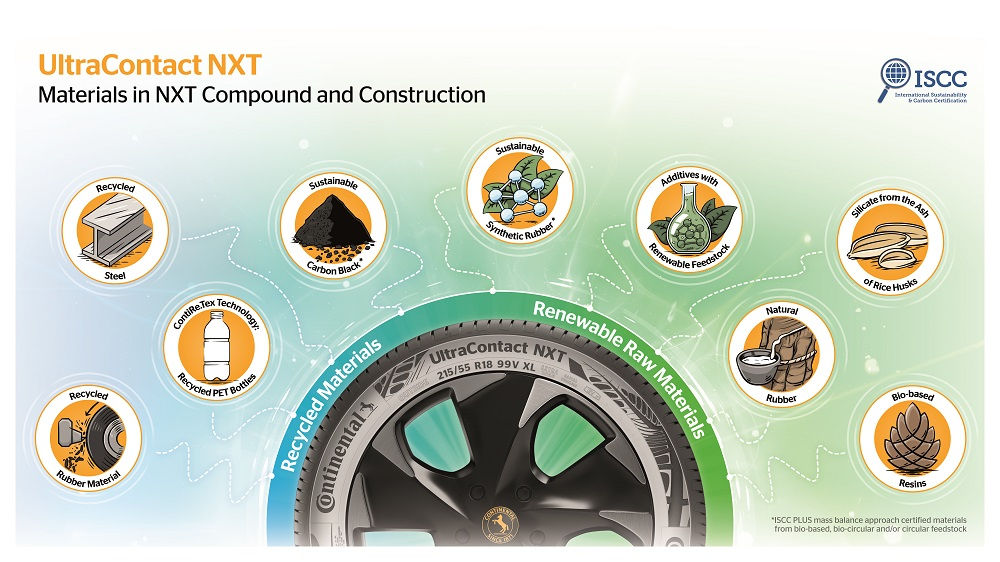Continental aims to achieve 100 per cent carbon neutrality across its entire value chain by 2050 at the latest and to be the most advanced tyre company in terms of sustainability
The 17th May was International Recycling Day, a key date that reminds us of the importance of adopting sustainable practices to preserve the health of the planet. And, as we advance as a society, its members, whether individuals or organisations, are increasingly aware that recycling must be a fundamental part of strategies to reduce pollution and fight climate change.
Continental is no stranger to this evolution and that is why, for years, it has been implementing a series of measures and processes, as well as developing technologies, that serve to reduce dependence on fossil fuels, promote the circular economy and reduce emissions. The German technology company. In addition, has developed the concept of Tires Vision 2030, an ambitious objective that aims to achieve 60 per cent sustainable materials in the company’s star products, a 20 per cent waste reduction, a 95 per cent waste recycling rate and a 20 per cent reduction in energy and water consumption.
ContiLifeCycle: since 2013 maintaining a centenary commitment
In 2013, Continental opened the ContiLifeCycle plant in Stöcken, Hannover district. This centre is their combination of a retreading plant and a recycling plant. With an integrated approach consisting of hot retreading of truck and bus tyres, as well as a rubber recycling system developed specifically for the ContiLifeCycle plant. The company has been actively promoting the sustainable use of raw materials, water and energy for a decade.
Since 2013, around 900,000 truck and bus tyres have had their service life extended thanks to retreading at the Hannover-Stöcken plant. But this commitment dates back to 1903, when Continental was already retreading tires at its Hannover-Vahrenwald plant, laying the foundations for what is known as the circular economy.
Cutting-edge technologies for a more responsible future
From the ContiRe and ContiTread technologies, developed for hot or cold retreading of tyres, to the innovative ContiRe.Tex, which manages to produce a high-quality polyester yarn produced from recycled polyethylene terephthalate (PET) bottles, and that can be used in new production tires. An example of this technology is UltraContact NXT, which has up to 65 per cent renewable, recycled and ISCC Plus mass balance certified materials with maximum safety and performance, being Continental’s most sustainable tire in production to date. Up to 28 per cent of them correspond to ISCC PLUS certified materials, such as synthetic rubber made from biobutadiene or industrial carbon black, part of which is produced from circular oil.
But not only the UltraContact NXT has this certification. The Lousado factory, where this tyre is produced, was also recognised in 2023 with International Sustainability and Carbon Certification (ISCC) PLUS, which confirms Continental’s compliance with special sustainability standards at this facility. This certification also attests to the transparency regarding the traceability of raw materials used in production processes. Through this certification, Continental can guarantee full traceability of materials from sustainable sources.
In addition, Continental is also developing sustainable tyres for the all-electric Extreme E racing competition. In developing the second generation of tyres in this test series, the company made sure to use an even higher proportion of sustainable materials. In fact, the tires have been manufactured with 43 per cent recycled and renewable raw materials. Among them, silica from rice husk ashes and the innovative ContiRe.Tex technology. These tyres are also part of the company’s circular economy strategy, since it also manages to give them a second life, extracting the recovered carbon black (rCB) to later use it in the production of Super Elastic solid tyres.
These are just some examples of Continental’s work to continue promoting the circular economy and promoting recycling and reuse of materials in the sector. The group works tirelessly to advance innovative technologies and sustainable products and services across its entire value chain, from sourcing sustainable materials to recycling end-of-life tyres. Continental aims to achieve 100 per cent carbon neutrality across its entire value chain by 2050 at the latest and to be the most advanced tire company in terms of sustainability.




















